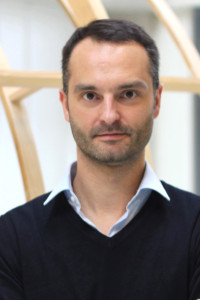Associate professor

I am Associate Professor at the Chemical and Cellular Immunology department of the Leiden University Medical Center. After a M.Sc in Cellular and Molecular Biology from the university of Nice Sophia Antipolis (Nice, France) in 1999, I received a PhD fellowship from the French Ministry of Education and Research and started a PhD in the department INSERM 491 headed by Prof. François Cuzin. In 2003, I completed my PhD and joined the group of Prof. Rob Hoeben at the LUMC to work on viral inhibitors of antigen presentation. In 2005, on a project initiated by Prof. Hoeben and with the support of the Dutch Diabetes Research Foundation, I have investigated the differentiation capacities of adult stem cells toward beta cells. In 2012, I was appointed as a Staff scientist at the Molecular Cell Biology (now Chemical and Cellular Immunology) dept, Leiden University Medical Center. In 2014, I joined the expert center for beta cells immunoprotection headed by Prof. Bart O. Roep to identify new neoantigens generated by beta cells and targeted by CD8 T-cells. I am currently bridging research on beta cell regeneration (Nephrology department) and immune protection (Immunohematology department).
Our group is focused on exploring the interplay between the immune system and the pancreatic beta cells in the immunopathogenesis of type 1 diabetes. With the support of the Dutch Diabetes Research Foundation, the DON foundation and JDRF, we aim at understanding the mechanisms underlying the generation of neo-epitopes (autoantigens) in pro-inflammatory and metabolic stress conditions, with a particular attention on the processes of transcription, translation and enzyme mediated-post-translational modifications. Our work has led to the innovative concept that beta cells may participate to their own demise in type 1 diabetes, in particular by generating translational errors recognized as non-self-products by the immune system. The newly identified targets are currently under investigation as potential biomarkers for diagnostic and targets for immune intervention.
Over the years, our group has also acquired expertise in cell engineering and genetic modification of primary human cells with a specific focus on immune evasion strategies to develop “stealth” technology for gene and cell therapy applications. We have a particular interest for strategies developed by viruses to evade the host immune response. Along this line, we have demonstrated that primary human beta cells can be genetically engineered to express herpesvirus-encoded immune-evasion proteins that can interfere with antigenic peptide presentation by inducing proteasomal degradation of HLA class I molecules, thereby protecting the beta cells from acute recurrent islet autoimmunity both in vitro and in vivo.
Kracht MJ, van Lummel M, Nikolic T, Joosten AM, Laban S, van der Slik AR, van Veelen PA, Carlotti F, de Koning EJ, Hoeben RC, Zaldumbide A*, Roep BO*.
Nat Med. 2017 Apr;23(4):501-507
Roep BO, Kracht MJ, van Lummel M, Zaldumbide A.
Curr Opin Immunol. 2016 Dec;43:67-73.
Kracht MJ, Roep BO, Zaldumbide A.
Trends Endocrinol Metab. 2016 Jun;27(6):353-62



Looking for information on one of our topics, a new place to conduct your research or experienced research to join forces with? Feel free to contact us.!